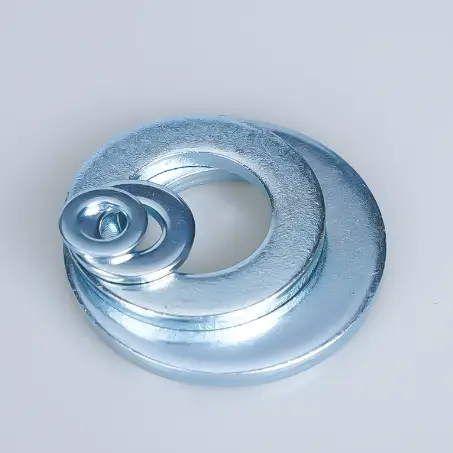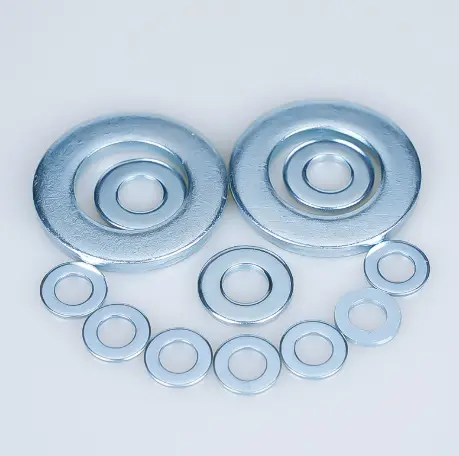CATEGORÍAS
Etiquetas
Cómo elegir la lavadora anti-pérdida adecuada para su aplicación de fijación

Publicado: 21 de noviembre de 2025
Categorías: Noticias
Los pernos trabajan duro. Mantienen juntas las máquinas, mantienen estables los marcos de acero y llevan peso día tras día. Pero los pernos no permanecen apretados para siempre. El calor, la vibración y el movimiento los hacen cambiar, y tarde o temprano algo comienza a sacudir.
Eso es cuando una pequeña parte como una lavadora anti-pérdida hace su trabajo en silencio. Agarra, extiende la carga y mantiene firme la articulación. La elección de la arandela adecuada puede parecer menor, pero en la práctica decide si una conexión permanece segura o falla lentamente.
¿Qué es una lavadora anti pérdida y por qué importa?
A primera vista, una arandela anti-pérdida parece simple: un delgado anillo de metal debajo de un perno o tuerca. Sin embargo, esa pequeña pieza controla cómo se mueve la presión a través de la articulación.
Cuando el perno se apreta, la arandela se sienta entre las caras metálicas y crea fricción. Esa fricción resiste al aflojamiento y protege la superficie debajo de arañazos o deformación.
Todos los campos los usan. Los equipos de construcción confían en arandelas para mantener las juntas de viga estables. Los mecánicos los usan para detener la vibración de las máquinas de agitación. Incluso los paneles eléctricos incluyen pequeñas arandelas para mantener los contactos cómodos. Una lavadora bien elegida añade silenciosamente seguridad, fiabilidad y una vida útil más larga.
¿Cómo funcionan los diferentes tipos de lavadoras en aplicaciones anti-pérdida?
No todas las lavadoras sirven al mismo propósito. Sus formas y dureza determinan cómo se comportan bajo tensión y vibración. QewitLas líneas principales cubren varios estándares comunes que se adaptan a diferentes tipos de trabajo.
Soporte básico y distribución de carga
Este es el estilo clásico. La lavadora redonda plana DIN 125A se extiende la fuerza de apriete uniformemente bajo la cabeza del perno o tuerca para que la superficie no se muestre. Qewit los produce en acero al carbono, acero inoxidable y latón, con niveles de dureza como 140 HV o 200 HV. Una capa de zinc o de escamo de zinc agrega resistencia a la corrosión, lo que la convierte en una opción de uso general confiable.
Resistencia a las vibraciones y recuperación elástica
Cuando el equipo vibra, una lavadora de resorte mantiene la presión constante. La lavadora Rect Spring DIN 127B se dobla ligeramente durante el apriete y actúa como un muelle que presiona hacia atrás. Ese pequeño movimiento mantiene los pernos apretados incluso cuando la temperatura o la carga cambian. Se utiliza ampliamente en motores, bombas y otros conjuntos móviles donde las arandelas planas ordinarias no pueden durar mucho tiempo.
Soluciones de montaje estructural de alta resistencia
Los grandes proyectos de acero requieren algo más duro. La lavadora plana Norma EN 14399-6 cumple con las normas europeas para pernos de alta tracción precargados. Estas arandelas soportan estructuras pesadas como puentes o torres, donde la tensión correcta es crítica. Ofrecen un grosor preciso y una dureza fiable, por lo que cada perno en el conjunto se comporta igual.
¿Qué material debe elegir para el rendimiento a largo plazo?
El material de una lavadora tiene tanto impacto como su forma. Recoger sabiamente significa equilibrar la resistencia, la protección contra la corrosión y el costo.
Acero al carbono: resistencia estándar con valor práctico
El acero al carbono es común porque es fuerte y asequible. Cuando se recubre con zinc, funciona bien para instalaciones interiores y trabajos ligeros al aire libre.
Acero inoxidable: resistencia a la corrosión en entornos hostiles
Para trabajos al aire libre o marinos, el acero inoxidable es más seguro. Qewit ofrece grados A2-70 y A4-70 que resisten al oxido y al daño químico. Mantienen el par constante y no se agarran, incluso después de una larga exposición a la humedad.
Opciones de Latón y Aleación – Usos Especiales y Conductividad Eléctrica
Cuando la apariencia o la conductividad son importantes, como paneles de control o herramientas de precisión, las arandelas de latón o cobre encajan mejor. Son más suaves, por lo que protegen superficies pulidas o delicadas, y conducen electricidad sin chispas.
¿Cómo afectan los acabados superficiales a la durabilidad y la anticorrosión?
Incluso el metal fuerte necesita protección. Los abrigos de acabado protegen las arandelas del oxido y el desgaste al tiempo que mejoran su aspecto.
Recubrimientos galvanizados y en escamo de zinc: protección diaria confiable
Las arandelas zincadas obtienen un tono plateado suave y una capa que ralentiza la corrosión. Las versiones de escamo de zinc, a menudo aplicadas a arandelas DIN 125A, manejan pruebas de pulverización de sal durante cientos de horas. Son una opción rentable para la mayoría de los usos de fábrica o sitio.

Galvanizado por inmersión en caliente (HDG) – Construido para el trabajo al aire libre
Las arandelas HDG se recubren sumergiéndolas en zinc fundido. El acabado grueso resiste la lluvia y el sol, lo que los hace ideales para la acerería expuesta. Pueden parecer áspero, pero duran mucho más tiempo en el exterior que las piezas con recubrimiento delgado.
Opciones de acabado personalizadas - hechas para condiciones específicas
Qewit también suministra recubrimientos galvanizados Geomet, Magni o mecánicos. Cada acabado ofrece una mezcla diferente de precio, color y resistencia. Elegir el correcto mantiene la articulación segura sin pagar por extras innecesarios.
¿Cómo verificar la calidad y el cumplimiento antes de la compra?
El precio importa, pero la calidad mantiene los proyectos seguros. Antes de comprar, es inteligente comprobar cómo el proveedor prueba y certifica sus lavadoras.
Pruebas y Certificación – Informes ISO 9001 y 3.1
Qewit ejecuta la producción bajo el sistema ISO 9001 y proporciona certificados 3.1 según DIN-EN-10204. Estos confirman la composición química, las dimensiones y la resistencia mecánica para cada lote.
Inspección dimensional y verificación de dureza
Cada lote pasa por pruebas de tracción, dureza y grosor de recubrimiento. Esta rutina asegura que las arandelas coincidan con los dibujos y funcionen de manera consistente en las líneas de montaje.
Muestraje previo al envío y aprobación del cliente
Las piezas personalizadas o no estándar se pueden muestrear antes de la ejecución completa. Comprobar las muestras temprano evita confusiones más tarde y mantiene los horarios de entrega estables.
¿Qué factores definen el ajuste adecuado para su aplicación?
Incluso una lavadora de alta calidad puede fallar si no coincide con la configuración. El ajuste, la carga y las condiciones de trabajo desempeñan un papel.
Tamaño del perno y compatibilidad de rosca
El agujero de la arandela debe ajustarse estrechamente al vástago del perno, ni suelto ni apretado. El seguimiento de las tablas de dimensionamiento DIN o ISO hace que la sustitución sea sencilla en todos los proyectos.
Distribución de carga y tensión de montaje
Presión de difusión de arandelas planas; las arandelas de resorte mantienen la tensión en movimiento. Las juntas de carga pesada a menudo necesitan planos más gruesos para detener la indentación, mientras que los sistemas vibradores dependen de muelles para mantener el agarre.
Condiciones ambientales y operacionales
Piense en el calor, la humedad y los productos químicos alrededor de la articulación. Las estructuras exteriores y marinas se benefician de recubrimientos de acero inoxidable o HDG. Para uso interior, el acero zincado generalmente hace el trabajo.
¿Por qué asociarse con Qewit para sus necesidades de lavadora anti-pérdida?
Detrás de cada sujetador fiable está un proveedor fiable. Qewit Fasteners Co., Ltd., fundada en 2004 con raíces británicas, se ha ganado confianza entre los compradores europeos y globales a través de una calidad consistente y un servicio sensible.
Gama completa de productos y opciones de materiales
Con más de 30 000 líneas de productos, Qewit permite a los clientes agrupar pedidos, desde pernos y tuercas hasta arandelas, en un solo envío. Esto ahorra costes de carga y tiempo de coordinación.
Soporte técnico y soluciones personalizadas
Sus ingenieros ayudan a los clientes a elegir los tamaños o materiales correctos de la arandela y pueden fabricar artículos no estándar a partir de dibujos o muestras físicas. Esta flexibilidad ayuda a los fabricantes originales y distribuidores a satisfacer necesidades de diseño únicas.
Capacidad de exportación global y servicio de entrega rápida
Desde las oficinas de Qingdao y Haiyan, Qewit exporta bajo términos EXW, FOB, CIF o DDU. Los modelos regulares como DIN 125A, DIN 127B y otras arandelas de alta tracción generalmente se envían en una a dos semanas. La logística constante mantiene los proyectos en el buen camino y los clientes satisfechos.
La asociación con un fabricante certificado ISO elimina las conjeturas de abastecimiento. La combinación de control de calidad, documentación completa y embalaje fiable de Qewit da a cada envío un acabado profesional.
Preguntas frecuentes
Q1: ¿Cuál es la principal diferencia entre arandelas planas y de resorte?
R: Las arandelas planas distribuyen la carga uniformemente y protegen la superficie. Las arandelas de resorte presionan contra la vibración para evitar que el perno se suelte.
Q2: ¿Cómo debe coincidir un tamaño de arandela con un perno?
R: Compruebe el diámetro nominal del perno y seleccione una arandela con un orificio interior similar bajo la misma serie DIN o ISO. Evite la separación excesiva o la articulación puede moverse.
Q3: ¿Puede Qewit producir arandelas especiales a petición?
R: Sí. Qewit fabrica arandelas personalizadas según dibujos o muestras del cliente, ofreciendo diferentes materiales, recubrimientos y niveles de dureza para cada aplicación.


